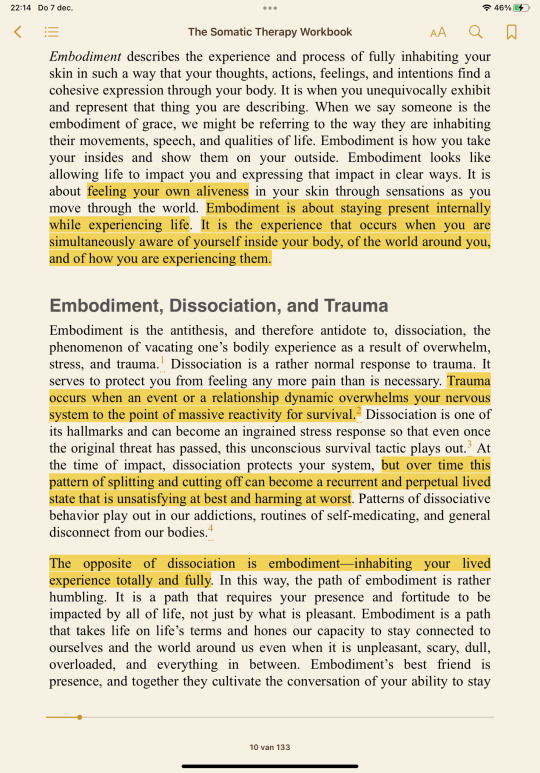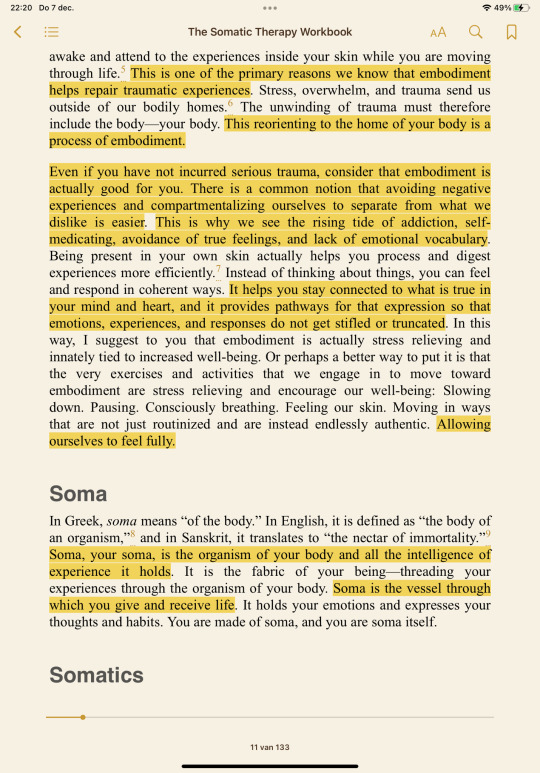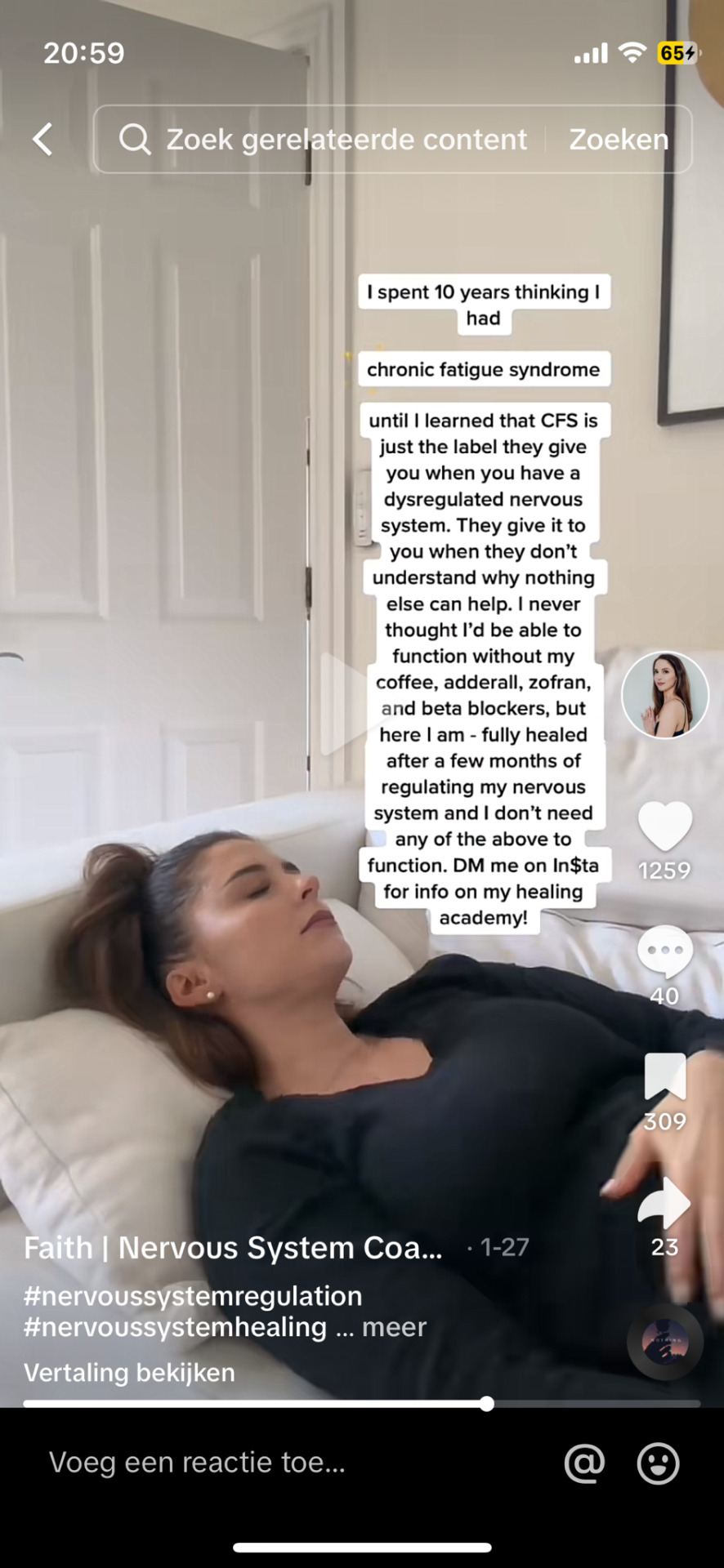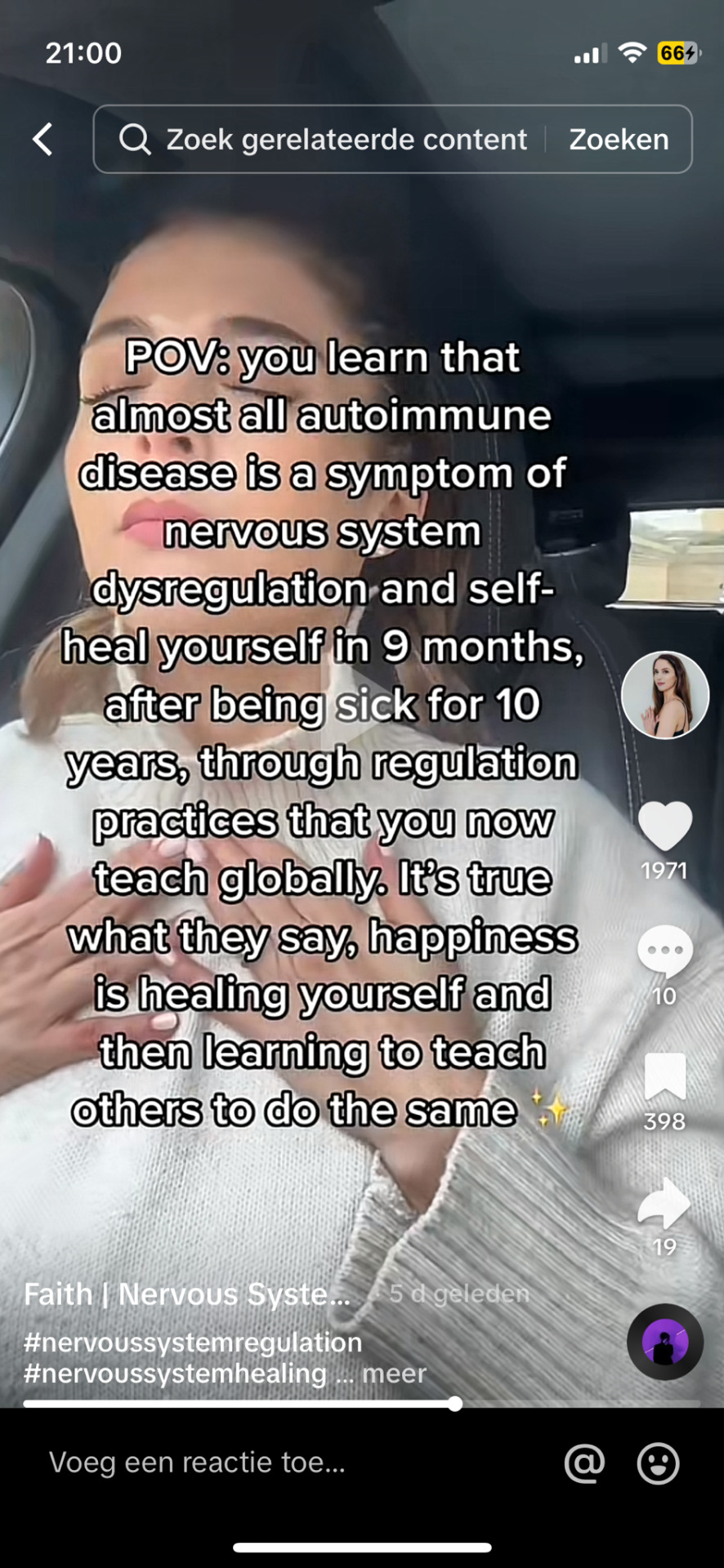#Nervous System Regulation
Explore tagged Tumblr posts
Text
nervous system regulation.
this post is especially dedicated for my fellow neurodivergents, specifically those who have add/adhd.
it’s normal for all of us to feel stressed sometimes. stress, as well as anxiety, are both feelings we all experience from time to time. however, dealing with a lot of stress is proven to have a negative impact on your body, more specifically your (autonomic) nervous system. by understanding how to regulate your nervous system, you will have an easier time managing stressful moments, and overall live a lot more balanced and peaceful life. ⋮ © credits
the nervous system.
your nervous system is the control center of your body. it is the part of your body that’s responsible for regulating your breathing, your heartbeat, your blood pressure, your digestion, and also the way you feel. the part of your nervous system that deals with the emotional wellbeing of yours is called "autonomic nervous system".
when feeling stressed, your body naturally reacts in a way to prepare you for the situation. it could respond through an increased heart rate, sweaty palms or the tension of muscles. nevertheless, our bodies cannot constantly withstand stress. continuously experiencing high levels of cortisol and adrenaline can lead to (sometimes serious) health issues.
a dysregulated nervous system.
a nervous system becomes dysregulated when the body cannot properly handle certain situations the way it used to. the body's way of responding to certain situations falls out of sync. it indicates a state of imbalance as you experience your body not being able to keep up with you.
signs.
these are some of the signs indicating you might have a dysregulated nervous system:
anxiety
easily irritated
memory problems
difficulty concentrating
headaches
quickly overwhelmed
mood swings
panic attacks
digestive issues
trouble sleeping
constant fatigue
chronic pain
persistent muscle tension
weakened immune system
stressors.
here is a list of stressors that are known to disrupt your nervous system balance:
chronic stress
burnout
traumatic events
poor sleep habits
unhealthy diet
no time for relaxation
support.
here are things you can do to help regulating your nervous system again:
meditating and resting
listening to music
dancing and moving
stretching and walking
eft tapping
massaging yourself
affirming
practicing mindfulness
reconnecting with nature
hugging someone or yourself
somatic shaking
rubbing ice cubes on face
taking a cold shower
sleeping and waking up early
grounding yourself
humming, singing and laughing
talking to someone
reading or listening
using a weighted blanket
drinking herbal tea
engaging in calming activities
deep breathing exercises
prioritising your sleep
with love, ella.
#nervous system regulation#nervous system#law of assumption#neville goddard#loassumption#loa#loablr#loa tumblr#manifesting#manifestation#how to manifest#manifest#master manifestor#the law of assumption#spiritual#spirituality#edward art#neurodivergent#adhd#add#positive thinking#mental health#mental heath support#mental heath awareness#mental help#mental heath issues#positivemindset#affirmations#positive thoughts#positive affirmations
391 notes
·
View notes
Text
How can you prepare for the Saturn return if you have Saturn in Aries?
Before the Saturn return, when you are having a good time or at least you’re not struggling with a debilitating crisis, you can start preparing for this transit.
The best way to do so is by giddying up your nervous system.
These are some simple practices that you can find helpful:
Having an analog hobby
Reading
Gardening
Baking
Spending time in nature
Doing sports or physical activity
Breathing exercises
Grounding
I know that this list sounds kind of naive or dumb in a world that is in shambles.
Still, I consider that going back to basics can provide a foundation from which to make structural changes in your existence.
Try to find practices that make you feel good.
Not in a self destructive way, but in a calm and relaxed way.
#astrology#astro observations#astro community#astro notes#astrology community#saturn return#astro tumblr#saturnreturn#late twenties#latetwenties#saturn in aries#nervous system regulation#saturn planet#saturn placements#astrological transits#astro placements#natal chart#astro posts#birth chart
114 notes
·
View notes
Text
god fucking dammit /neu/pos
i need to stim way more and way harder.
i just got off therapy appt and realized during it when talking about how dysregulated i am so much of the time, all of the brain hyperactivity and thought hyperconnectedness, that oh man a big part of this is my brain is overstimulating itself, and then, when doing some of the somatic physical/breathing exercises, *oh my god this is just stimming and i need to stim*.
i thought i was fully unmasked, i have already been stimming lots, ive ALREADY been doing what (seemed) NATURAL and good and whole, but theres still stuff being held back, still so much, still too much, and i need to fuckin YELL and SIGH and SHAKE and THUD and SWAY and MOVE and AUUUAGAHAGAHAGUHGFHHBGGHHHhhhhh....
so yeah uh. pointing at you the viewer
we have so much consciously and unconsciously holding us back from stimming and acting weird or concerning or irritating or scary to others. you are holding back stimming more than you know. please pleaspleaseplease try and build more opportunities and methods in so you can stim more than you think you need to
#brain stuff#autism#therapy#mental health#adulting#SCREAMS AND SHOUTS SO LOUD AT THE TOP OF A HILL (in my heart. i need to find some ways to muffle sound so i can vocal stim in public more)#stimming#stims#nervous system regulation
122 notes
·
View notes
Text
I intentionally live a slow life, because I do not want my mind or body to believe we have to rush through anything in life. I give myself time to get up, eat, get ready, do my tasks, enjoy my hobbies, walking in nature, clean, get to bed, whatever it is I will find a way to do it without rushing or getting stressed. Everything is planned intentionally, and I never pack my day in the name of productivity. I am not a machine and never wish to be one even if the world tries it's best to rush me. I get things done at my pace, and that pace sets the tone for the peaceful life I want to live.
#thinkpink thoughts#thinkpink perosnal#slow living#slowing down#nervous system regulation#no lack mindset over here - we have time
99 notes
·
View notes
Text
Nervous System Regulation









Future ADHD
#ADHD#ADHD post#ADHD & the nervous system#nervous system regulation#tips for regulation#feel free to reblog and share#Future ADHD (Facebook)
297 notes
·
View notes
Text




75 notes
·
View notes
Text

5 notes
·
View notes
Text
don’t care if it sounds cringe, regulating ur nervous system is actually the shit (*´Д`*) … i feel a lot better today ^_^
7 notes
·
View notes
Text
Here is the full SEO-optimized blog post based on the outline:
How Your Body Responds to Unmasking: A Guide to Self-Awareness and Safety
Introduction
Unmasking is the process of shedding the protective behaviors we adopt to fit into social expectations. Whether you’re neurodivergent, a people-pleaser, or simply someone who has learned to suppress parts of yourself to feel accepted, unmasking can feel both freeing and terrifying.
But have you ever stopped to notice how your body reacts to unmasking? The nervous system plays a crucial role in determining whether we feel safe or threatened in any situation. Tuning into these physical responses can help us better understand our emotional landscape and build greater self-trust.
In this guide, we’ll explore how your body reacts to unmasking, setting boundaries, resting, and being misunderstood—and how to cultivate a sense of safety in all of these experiences.
The Body’s Response to Unmasking
What Is Masking?
Masking refers to the behaviors we adopt to blend in, avoid conflict, or meet societal expectations. For neurodivergent individuals, this often means mimicking neurotypical behaviors to avoid standing out. But masking isn’t exclusive to neurodivergence—many people suppress their true thoughts, emotions, or needs to maintain harmony in social settings.
While masking can be a survival tool, prolonged suppression of your authentic self can lead to exhaustion, anxiety, and disconnection from your true identity.
How Does Your Body React to Unmasking?
If you take a deep breath and imagine fully unmasking, how does your body respond?
• Relaxed, open, free → Your body trusts that it’s safe to be yourself.
• Tight, tense, a little nervous → Your nervous system is hesitant but open to unmasking.
• Frozen, panicked, or exhausted → Your body doesn’t trust unmasking yet; it perceives it as a threat.
These reactions come from your nervous system’s interpretation of safety. If unmasking triggers fear or exhaustion, it’s not because you’re weak—it’s because your body has learned to associate authenticity with risk.
The Power of Saying No Without Guilt
Why Do We Struggle to Say No?
Saying “no” can feel difficult, especially if you’ve been conditioned to prioritize others’ needs over your own. Many people fear rejection, conflict, or the guilt that comes with setting boundaries.
How Does Your Body React When You Say No?
• Confident and relaxed → You trust that your energy is valuable.
• Hesitant and unsure → You second-guess yourself, fearing how others will react.
• Guilty and anxious → You feel obligated to explain or overcompensate.
Learning to Set Boundaries Without Guilt
If saying no feels unsafe, your nervous system may be operating in people-pleasing mode—a survival response that prioritizes external approval over internal needs. Here’s how to shift that:
•Practice small no’s → Start with low-stakes situations and build confidence.
•Regulate your nervous system → Deep breathing and grounding techniques can help you feel safer in the moment.
•Reframe guilt → Remind yourself that saying no is an act of self-care, not selfishness.
Your Relationship with Rest
The Importance of Rest for Mental and Physical Health
We live in a society that glorifies productivity, often making rest feel like a luxury instead of a necessity. However, rest is essential for nervous system regulation, creativity, and overall well-being.
How Does Your Body Respond to Rest?
•Feels good, no guilt → You have a healthy relationship with rest.
•Rest, but feel guilty → You struggle with the belief that you must “earn” relaxation.
•Avoid rest, feel like you’re falling behind → Deep-seated anxiety makes rest feel unsafe.
Reframing Rest as a Necessity, Not a Reward
If you struggle with resting without guilt, consider these mindset shifts:
•Rest is productive → Your body and mind function better when they’re replenished.
•You don’t have to earn rest → You’re allowed to rest simply because you exist.
•Listen to your body’s cues → Fatigue, irritability, and burnout are signs that rest is needed, not optional.
Coping with Being Misunderstood
Why Misunderstanding Feels Threatening
Many of us fear being misunderstood because it threatens our sense of belonging. If you’ve ever felt dismissed, invalidated, or judged, your nervous system may associate misunderstanding with emotional danger.
How Does Your Body React to Being Misunderstood?
•Stay centered → You know that others’ perceptions don’t define you.
•Get anxious but hold back → You want to explain yourself but hesitate.
•Shut down or spiral → You feel overwhelmed and question your self-worth.
Strategies to Stay Grounded When Misunderstood
1.Self-validate → Remind yourself that your truth is still valid, even if others don’t understand.
2.Practice non-attachment → People’s perceptions are shaped by their own experiences, not just your words.
3.Use nervous system regulation tools → Deep breathing, grounding techniques, and movement can help you feel safer.
Conclusion
Your body is always communicating with you. Whether you feel safe or hesitant about unmasking, setting boundaries, resting, or handling misunderstandings, these responses are not weaknesses—they are reflections of your nervous system’s learned experiences.
By practicing self-awareness, honoring your needs, and creating a sense of internal safety, you can slowly rewire your relationship with authenticity and self-expression.
Final thought: Your body is not your enemy—it is your guide. Learning to listen to it is one of the most powerful acts of self-trust and self-love.
FAQs
1. What is unmasking, and why does it feel uncomfortable?
Unmasking refers to the process of shedding socially conditioned behaviors and expressing your authentic self. It can feel uncomfortable because your nervous system may associate authenticity with risk.
2. How can I make saying “no” feel safer?
Start by practicing small no’s in low-stakes situations. Regulate your nervous system with deep breathing, and remind yourself that boundaries are a sign of self-respect, not selfishness.
3. Why do I feel guilty when I rest?
Society often equates productivity with worth, making rest feel undeserved. Reframe rest as a necessity rather than a luxury.
4. How do I stop spiraling when someone misunderstands me?
Self-validation is key. Remind yourself that you do not need to be fully understood to be valid. Practicing nervous system regulation can also help you stay grounded.
5. How can I create a sense of internal safety?
Work on nervous system regulation through mindfulness, breathwork, and grounding techniques. Building self-trust through small, consistent actions also helps create a sense of safety.
#higher self#actually neurodiverse#unmasking#self care#inner thoughts#inner child#self awareness#nervous system regulation#nervous subject#girlblogging#self confidence#self concept#self improvement#self trust#safety#girly#highly sensitive person#highly sensitive people#boundaries
3 notes
·
View notes
Text
One month sober ✨️🎉🥰
#sobriety#sober#detox#liver detox#heart health#nervous system regulation#natural medicine#herbal remedies#manjistha#emotional detox#lymphatic drainage#scorpio full moon
3 notes
·
View notes
Text
Nervous system regulation is crucial, not only for preparing for the Saturn return, but also for being more resilient in general.
#nervous system regulation#burnout#surviving#stress#nervous system#mental health#psychology#astrology#astro observations#astro community#astro notes#astrology community#astro tumblr#saturn#saturn return#saturnreturn#late twenties
20 notes
·
View notes
Text
Calm Isn’t Boring, It’s Safe
Confessions of a Late Bloomer Part 11 For a long time, I thought love was supposed to feel like butterflies.That quickening. That rush. That tingle in your gut that made it hard to breathe. I thought adrenaline meant attraction.I thought chaos was chemistry.I thought that if it wasn’t all-consuming, messy, magnetic, heart-racing, it wasn’t real. No one told me that I had learned to confuse…
#butterflies aren&039;t love#calm is chemistry#Choosing Peace#dating after divorce#emotional healing#empower#empowering#from anciety to alignment#Healthy Love#Late Bloomer#love that feels safe#Nervous System Regulation#personal growth#post-trauma dating#real love versus almost love#relationship growth#secure attachment#Self-trust#slow love#somatic awareness#the clever confidante#Trauma-Informed Love#unlearning patterns
2 notes
·
View notes
Note
What do you do when you have a miserable day? What's something that makes you feel better?
Oh boy, okay.
What do I do? Honestly, I usually make myself a concerningly strong vodka soda, but that doesn't actually make me feel better.
So, what makes me feel better? Just fucking crying about it.
I've always been an easy crier— movies, songs, commercials, you name it, it's brought me to tears. I cry when other people cry, I cry when I'm stressed, I cry when I'm happy. My whole life I've been told that I'm overly emotional and until recently, I believed them.
I don't think I've ever had a regulated nervous system. I don't think I've ever been able to properly feel my emotions, and I've certainly never been able to express them in any sort of way. For the longest time, I thought the crying was the bad thing, the evidence of how pathetic I was, I thought the goal was to stop crying, and now I'm realizing, the reason I cry at everything is because I've never allowed myself to just fucking cry about the things that are making me miserable. I've spent my entire life trying to rationalize the tears, now I'm learning they've been there for a reason.
It's not enjoyable. I hate doing it. But when I've let myself truly feel the misery and the tears finally stop and I'm laying on the floor exhausted and wrung out— I actually feel better. Actually better.
Be kind to yourself 🖤 I hope this helps
10 notes
·
View notes
Text
instagram
43 notes
·
View notes
Text

Strike at the root ➡️ honor your nervous system to develop resilience & stability from within 💜 from this place of power, you can meet the demands of reality in every situation that presents in your life.
#self care#resilience#nervous system regulation#kindness#self love#rooted#grounded#strength#somatics#hold space#healing
12 notes
·
View notes
Text
Life + Business Update
Hey friends, just wanted to share an important shift that's happened recently.
If you're following me on here, you're mostly likely into astrology, numerology, and cardology. I've been a professional psychic for about 3 years and I'm deeply dedicated to these studies. I still do readings but it's not my primary focus anymore.
From 2020 to 2023, I struggled with anxiety, panic attacks, OCD, and agoraphobia. I was dealing with it daily and I felt completely lost. No one could help in the way I needed. I had to figure it out myself.
In 2024, I finally started to heal and it completely changed my life. I learned how to regulate my nervous system, shift my beliefs, and actually feel safe in my body again. I've always been passionate about somatic healing and trauma work, as well as the idea that we are powerful creators and can craft our life into what we want.
So I've blended these two into manifestation and anxiety coaching. I still do intuitive readings, but coaching is where my heart and focus is now.
Going forward, I'm focusing on healing from a holistic perspective: - nervous system support + regulation - mindset + subconscious rewiring - manifestation that doesn't spiritually bypass - real tools for anxiety + panic
This space is now dedicated to those who feel overwhelmed, anxious, spiritually blocked but still deeply believe in healing, in the mind-body-soul connection, and in intentionally creating the life they want.
We're not bypassing anything by focusing on spiritual work. And we're not dismissing our inner power by focusing on psychological or trauma healing.
Thank you to everyone who has been following since the early days of astrology and intuitive posts. This next chapter is still rooted in intuition, but now it's also about healing, wholeness, and calm creation.
If that's what you need, stick around.
—Rekha 🤍
instagram | tiktok | threads | youtube
#healing anxiety#anxiety support#healing panic attacks#nervous system regulation#nervous system healing#neville goddard#the law of assumption#grounded manifestation#agoraphobia healing
5 notes
·
View notes